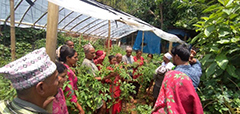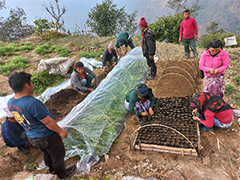- Home
- Technical Cooperation Projects
- Index of Countries
- Asia
- Nepal
- The Project on Participatory Rural Recovery
- Project News
- Community Resilience Projects (CRPs) – Part 1 Building rural communities’ resilience through sustainable vegetable farming
Project News
2023-08-08
Community Resilience Projects (CRPs) – Part 1
Building rural communities’ resilience through sustainable vegetable farming
‘Project on Participatory Rural Recovery (PPRR)’ supported the local governments implement ‘Community Resilience Projects (CRPs)’ in the communities severely affected after the 2015 massive earthquake, which aimed to promote economic recovery, resilient livelihoods, and community participation, with a focus on empowering and strengthening various community groups, such as women’s cooperatives, farmers’ groups, saving and credit cooperatives. While various types of livelihood recovery projects have been supported based on the needs and demands by the community groups themselves, the CRPs adopted a ‘packaged’ approach for capacity development. In the case of vegetable farming, the CRP includes a full range of support starting from necessary equipment and materials, a series of training on off-season vegetable farming, to community level disaster preparedness promotion. Total of 320 community members benefitted from the vegetable farming CRPs.
Improved capacity in vegetable farming and marketing
 Community Group working at a plastic tunnel in Chautara
Community Group working at a plastic tunnel in Chautara
The community groups constructed green houses for year-round vegetable farming, procured necessary tools and equipment, and conducted exposure visits to farms implementing cutting-edge farming techniques to learn from successful practices. They also received training covering various topics such as nursery preparation, green house construction, irrigation techniques, climate-resilient vegetable production and effective pest and disease management practices. Business and marketing skills were also enhanced as the community groups conducted market research, received training in marketing strategies, post-harvest handling techniques, business planning and record keeping practices.
Enhanced community resilience and improved disaster preparedness
For enhancing disaster preparedness and resilience, the community groups held discussions about disasters in their own areas at their regular meetings, and also participated in community-level disaster risk reduction training provided by the Ward Disaster Management Committees, which included conducting risk mapping exercises. These efforts helped them understand disaster risk and prepare for future disasters effectively.
Enhanced community participation including women and DAGs
Community participation especially among women and DAGs (disadvantaged groups), was actively encouraged through gatherings and orientations. For some DAG participants, this was their first time receiving such support, and various project activities have contributed to gradual empowerment of individual members as well as a group as a whole. The groups submitted project proposals to local authorities and conducted bi-annual ward monitoring and public audits to ensure transparency and accountability in their activities.
 Vegetable nursery in Huiche Goje Barpak
Vegetable nursery in Huiche Goje Barpak
The community groups achieved significant milestones during the project period, including successful green house construction for extended growing season and increased income. Particularly selling off-season vegetables in nearby markets has led to their increased incomes, whereas some people hardly earned any income during the monsoon season before the CRP. While they still faced some challenges such as accessing markets, dealing with disaster and disruptions like hailstorms and wild animal attacks, lack of irrigation facilities, etc., the community groups learned the importance of effective collaboration with local governments and the strength of working as a group. These lessons shaped their approach to sustainable vegetable farming and commitment to resilient livelihoods, providing valuable guidance to the future.
- About JICA
- News & Features
- Countries & Regions
- Our Work
- Thematic Issues
- Types of Assistance
- Partnerships with Other Development Partners
- Climate Change / Environmental and Social Considerations
- Evaluations
- Compliance and Anti-corruption
- Science and Technology Cooperation on Global Issues
- Research
- JICA Development Studies Program / JICA Chair
- Support for the Acceptance of Foreign HRs / Multicultural and Inclusive Community
- Publications
- Investor Relations
